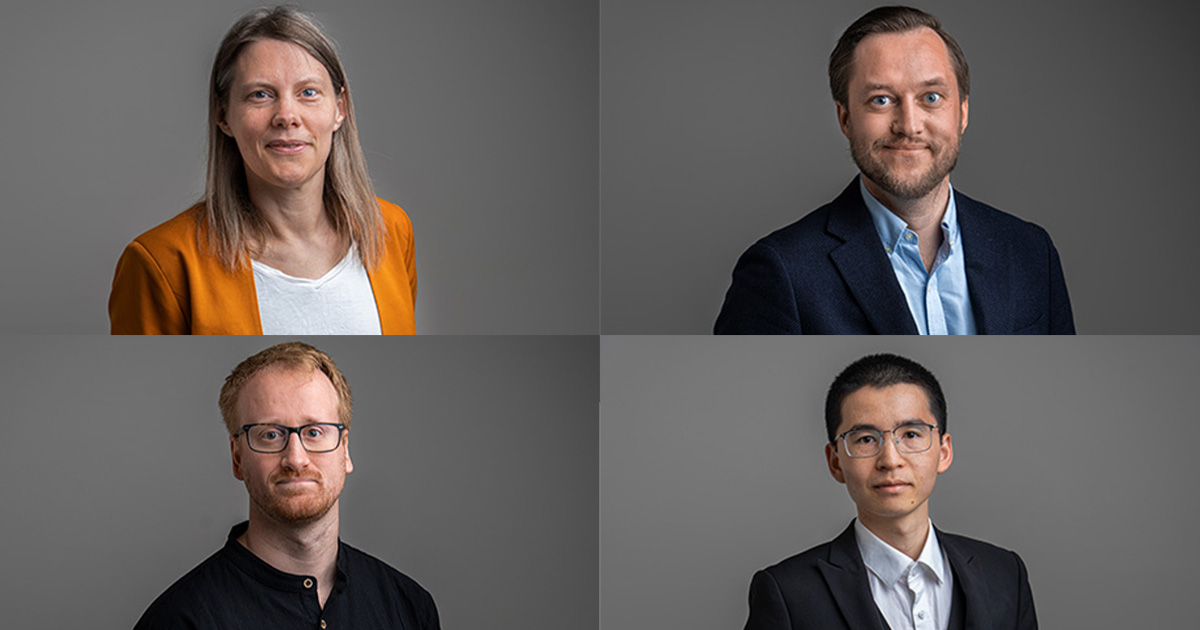
SDU researchers receive prestigious Sapere Aude grants
Four excellent researchers from SDU have been awarded DKK 6 million from Independent Research Fund Denmark for groundbreaking research in quantum technology, solar cells, heart disease and the deep sea. Read more about their projects.
Four extremely talented SDU researchers has been selected among the chosen few, and today they received one of the prestigious Sapere Aude-grants from Independent Research Fund Denmark.
With each grant of approx. 6 million kroner, the young researchers now have the opportunity to develop their own ground-breaking ideas and their research management.
In the projects, the four researchers are investigating areas as diverse as quantum programming, oxygen in the deep sea, links between common heart disease and type 2 diabetes, and data-driven solar cell repairs.
More about the researchers and their projects
Anne Loft, assistant professor at the Department of Biochemistry and Molecular Biology
Coronary artery disease is the most common type of heart disease and one of the leading causes of death globally. The disease is a huge societal problem that is constantly exacerbated by the growing epidemic of obesity and related diseases, such as type 2 diabetes.
Although type 2 diabetes is a major risk factor for the development of coronary artery disease, it is still unclear which bodies and cell types contribute to the increased risk in patients with type 2 diabetes.
This project investigates whether diabetes-associated changes in the fatty tissue surrounding the coronary arteries can influence the development of coronary artery disease. In the longer term, we hope that the project will lead to the development of new methods for the treatment of coronary artery disease.
Robin Kaarsgaard Sales, assistant professor at the Department of Mathematics and Computer Science
Quantum computing has the potential to revolutionise computation in many branches of science. Programming quantum computers usually use quantum circuits, which are the smallest building blocks of quantum computing, but require special expertise to use.
In our research project, FunQ, we will develop a quantum programming language that makes it much easier for programmers to utilise the potential of quantum computing. We want to bridge the gap between the complex world of quantum circuits and the more user-friendly way of programming computers that we know from today's programming languages.
If we succeed, we will open the door to exciting opportunities in a wide range of fields such as simulation, cybersecurity, optimisation, which were previously reserved for quantum computing experts.
Read more
Vincent Marc Le Corre, assistant professor at the Mads Clausen Institute
The R2-D2 project aims to develop an automated “device doctor” for perovskite solar cells (PSCs) that can diagnose performance problems and recommend solutions. Like a medical diagnosis, this system will identify the limiting factors - 'diseases' - in PSCs and suggest the best course of improvements - 'treatments' - that can increase the performance and stability of the solar cells.
By utilising robotics for high-throughput solar cell manufacturing combined with advanced machine learning algorithms, the system will continuously improve its understanding of material properties and its impact on device performance.
The R2D2 "device doctor" will ultimately become a powerful, accessible (open source) tool to diagnose problems and advance solar cell technology through customised data-driven solutions.
Wenjie Xiao, postdoc at the Department of Biology
Oxygen is vital to all life and plays a crucial role in the mobility and metabolism of nutrients and elements on Earth. In the deep sea, oxygen ensures a relatively efficient decomposition of deposited organic matter. Seabed oxygen uptake not only affects life on the ocean floor, it is also an important indicator of ocean health and influences the global climate, as oxygen consumption regulates carbon burial in the seabed.
Current methods for measuring oxygen uptake in the deep sea are very advanced, with only a few research groups mastering this technique. This project will develop a new method that couples oxygen uptake with specific organic molecules produced by bacteria in the seabed. The distribution of these molecules can serve as a measure of seabed oxygen consumption now and in the past.
By studying deep-sea sediments from around the world and conducting laboratory experiments, we will understand the surprising relationship between the molecules and oxygen consumption that we have demonstrated. The results will give us a fundamentally new understanding of deep-sea oxygen dynamics, the global carbon cycle and climate change in the present and throughout Earth's history.
Sapere Aude grants - in short
All the researchers receiving grants today have been involved in a tough selection process, where only the most talented are left with a Sapere Aude: DFF research leader grant.
The Independent Research Fund Denmark has received 354 applications and awarded 36 grants, corresponding to a success rate of 10%, both in terms of amount applied for and number of applications.
More about this years Sapere Aude: DFF research leader grants



